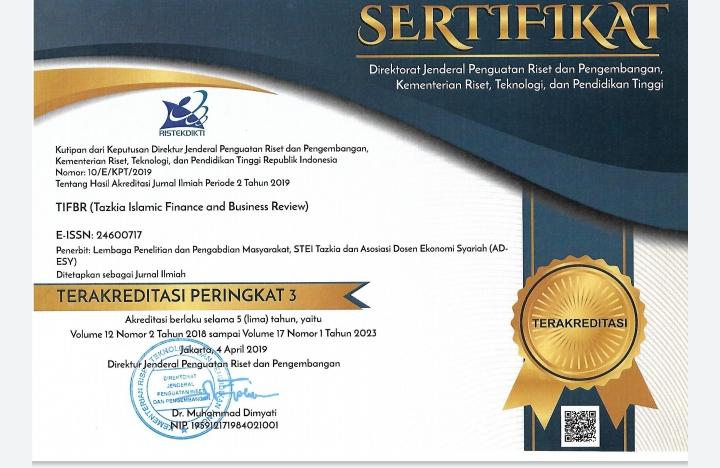Analysis of the Effect of Sharia Supervisory Board (SSB) Function on Earning Quality of Islamic Banks
DOI:
https://doi.org/10.30993/tifbr.v10i2.109Keywords:
Quality of profit, Sharia Supervisory Board (SSB), Sharia/Islamic Bank.Abstract
Analysis of the Effect of Sharia Supervisory Board (SSB) Function
on Earning Quality of Islamic Banks
Grandis Imama Hendra, MSACC
Lecturer of Islamic Accounting, STEI Tazkia
ABSTRACT
Objective - This study aims to identify the effect of Sharia Supervisory Board (SSB) function on the level of earnings quality in Indonesian Islamic banks. SSB criteria used in this study are size, frequency of Meeting and educational background (Finance / Accounting).
Method - Panel data regression is employed to analyze the effect of Sharia Supervisory Board characteristics on the earning quality of Islamic bank. The data were taken from 11 full-fledge Islamic banks in Indonesia with available financial statements from period 2010 to 2015.
Results - The size of Sharia Supervisory Board members has a positive effect on the improvement of earning quality in Islamic banking. Two other variables, namely the frequency of SSB meetings and educational background do not affect the improvement of earnings quality.
Conclusion - Studies of the role of Sharia Supervisory Board to the quality of financial statements is still limited, especially in the quality of earning that became the basis in determining the distribution of Islamic banks profit sharing. The main contribution in this research is that the role of SSB should be improved in order to increase the quality of financial reporting.
Keyword: Quality of profit, Sharia Supervisory Board (SSB), Sharia/Islamic Bank.
References
Alnasser, S.A.S., & Muhammed, J. (2012). Introduction to Corporate Governance from Islamic Perspective. Humanomics. Vol. 28 (3). pp. 220-231
Anwar, M., Song, L., dan Wu, Q., (2011). Do Islamic Banks Employ Less Earnings Management. ERF 17 th Annual Conference.
Anwar, Majdi Quttainah, Liang Song & Qiang Wu (2013), "Do Islamic Banks Employ Less Earnings Management?", Journal of International Financial Management & Accounting, 24: 203-233.
Faradila, A., & Cahyati, A. D. (2013). Analisis manajemen laba pada perbankan syariah. Jurnal Riset Akuntansi Keuangan, 4(1), 57–74.
Ghayad, Racha (2008). Corporate Governance and the Global Performance of Islamic Banks. Humanomics, Vol. 24 Iss 3 pp. 207 - 2016
Grassa, R. & Matoussi, H. (2014). Corporate Governance of Islamic Banks. International Journal of Islamic and Middle Eastern Finance and Management, Vol. 7 Iss 3 pp. 346 – 362.
Hamdi, F. M. & Zarai, M. A. (2014). Corporate Governance Practices and Earnings Management in Islamic Banking Institutions.Research Journal of Finance and Accounting, Vol.5, No.9.
Khandelwal, Sunil Kumar (2009) Corporate Governance in Islamic Banking instittution. Working Paper, EFA 36 Annual meeting, Bergen, Norwey.
Mohamad, M.H.S, Rashid, H.M.A & Shawtari, F.A.M. (2012). Corporate governance and earning management in Malaysian government linked companies: The impact of GLCs' transformation policy. Asian Review of Accounting, Vol. 20 Iss: 3 pp. 241 – 258.
Mukhlisin, Murniati (2017) Bank Syariah Mau Maju Pesat? Harus Kaffah, diakses 17 April 2017https://www.hidayatullah.com/berita/ekonomi-syariah/read/2017/04/17/115050/115050.html
Othman, H. B. & Hounaida Mersni (2014), The Use of discretionary Loan loss provision byislamic banks & Conventional banks in the Middle East Region.
Rashidah, A. R., & Faisal, D. (2012). Introduction to corporate governance from Islamic perspective. Humanomics, 28(3), 220–231. https://doi.org/10.1108/08288661211258110
Rini, R (2014). The effect of audit committee role and sharia supervisory board role on financial reporting quality at Islamic banks in Indonesia. Journal of Economics, Business, and Accountancy| Ventura, 17(1), 145–156. https://doi.org/10.14414/jebav.14.170113
Shittu I., Ahmad A. C. & Zuaini Ishak (2016) Board Characteristics and Earnings per Share of Malaysian Islamic Banks. International Journal of Economics and Financial Issues, 2016, 6(S6) 135-137.
Suryanto, Tulus (2014) Manajemen Laba Pada Bank Syariah Di Indonesia: Peran Komite Audit Dan Dewan Pengawas Syariah.Kinerja, Volume 18, No.1, Th. 2014: Hal. 90-100.
Taktak, N., Shabou, R. and Dumontier, P. (2010), Income smoothing practices: evidence from banks operating in OECD countries, International Journal of Economics and Finance, Vol. 2 No. 4, pp. 140-151.
Wardhany, N., & Arshad, S. (2012). The Role of Shariah Board in Islamic Banks: A Case Study of Malaysia, Indonesia and Brunei Darussalam. Working Paper, 2ISRA Colloquium.
Downloads
Published
How to Cite
Issue
Section
License

Tazkia Islamic Finance and Business Review (TIFBR) is licensed under a Creative Commons Attribution-NonCommercial 4.0 International License.
Authors who publish with this journal agree to the following terms:
- Authors retain copyright and grant the journal right of first publication with the work simultaneously licensed under a Creative Commons Attribution License that allows others to share the work with an acknowledgment of the work's authorship and initial publication in this journal.
- Authors are able to enter into separate, additional contractual arrangements for the non-exclusive distribution of the journal's published version of the work (e.g., post it to an institutional repository or publish it in a book), with an acknowledgment of its initial publication in this journal.
- Authors are permitted and encouraged to post their work online (e.g., in institutional repositories or on their website), as it can lead to productive exchanges, as well as earlier and greater citation of published work (See the Effect of Open Access).

















